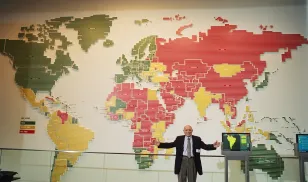


South Korea
South Koreans benefit from regular rotations of power and robust political pluralism. Civil liberties are generally respected, though the country struggles with minority rights and social integration. Corruption and misogyny are persistent problems, with scandals implicating successive governments and company executives in recent years.
Research & Recommendations
South Korea
| PR Political Rights | 32 40 |
| CL Civil Liberties | 49 60 |
Overview
South Koreans benefit from regular rotations of power and robust political pluralism. Civil liberties are generally respected, though the country struggles with minority rights and social integration. Legal bans on pro–North Korean activity affect legitimate political expression, and journalists can face pressure from the government over their coverage of or commentary on powerful political party members. Corruption is a persistent threat, with scandals implicating successive governments and company executives in recent years. Misogyny is also a chronic problem, and domestic violence, gender-based violence, and deepfake pornography are common despite laws meant to combat them.
In countries where democratic forces have come to power after periods of antidemocratic rule, the new governments should pursue an agenda that protects and expands freedoms even as it delivers tangible economic and social benefits to citizens.
These countries must act swiftly to release all political prisoners, build or revitalize democratic institutions, reform police and other security forces, organize and hold competitive multiparty elections, and ensure accountability for past human rights violations.
In countries where there has been significant erosion of political rights and civil liberties, policymakers, legislators, jurists, civic activists, and donor communities should work to strengthen institutional guardrails and norms that serve to constrain elected leaders with antidemocratic or illiberal aims.
South Korea
| A Obstacles to Access | 21 25 |
| B Limits on Content | 23 35 |
| C Violations of User Rights | 21 40 |
Political Overview
South Koreans benefit from regular rotations of power and robust political pluralism. Civil liberties are generally respected, though the country struggles to uphold the rights and ensure the social integration of minority groups. Legal bans on pro–North Korean activity affect legitimate political expression, and journalists can face pressure from the government over their coverage of or commentary on powerful political party members. Corruption is a persistent threat, with scandals implicating successive governments and company executives in recent years. Misogyny is also a chronic problem, and domestic violence, gender-based violence, and deepfake pornography are common despite laws meant to combat them.
Freedom of expression online has been and is increasingly under attack as governments shut off internet connectivity, block social media platforms, and restrict access to websites that host political, social, and religious speech. Protecting freedom of expression will require strong legal and regulatory safeguards for digital communications.
Governments should encourage a whole-of-society approach to fostering a high-quality, diverse, and trustworthy information space. The Global Declaration on Information Integrity Online identifies best practices for safeguarding the information ecosystem, to which governments should adhere.
Comprehensive data-protection regulations and industry policies on data protection are essential for upholding privacy and combating disproportionate government surveillance, but they require careful crafting to ensure that they do not contribute to internet fragmentation—the siloing of the global internet into nation-based segments—and cannot be used by governments to undermine privacy and other fundamental freedoms.



